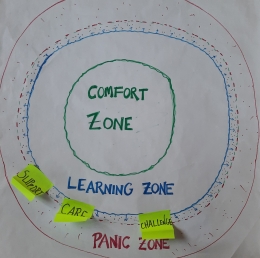„Ohne Übertreibung, bester Kurs den ich je gemacht habe. Ich treff mich immer noch jede paar Wochen mit meinem Check-in Team um Übungen aus den Kurs gemeinsam zu machen.“ – Sergiu Zorger, Teilnehmer an Training Ecology of Social Movements
Seit dem Sommer 2019 arbeiten wir im Rahmen des europaweiten Bildungsprojektes „Pro-Environmental Education“ mit dem Trainingszentrum Ulex des Col·lectiu Eco-Actiu in Nordkatalonien zusammen.
Dieser Ort bietet gemeinsam mit uns Kurse für Menschen an, die sich für sozialen und ökologischen Wandel einsetzen. Mit einem ganzheitlichen Bildungsansatz werden Theorie und Praxis für persönliche, gruppendynamische und gesellschaftliche Transformation vermittelt. Aktive aus dem Umfeld unseres Vereins nahmen an internationalen Kursen teil, um ihre eigene Arbeit zu reflektieren, und nahmen viele Erfahrungen und neue Methoden für unser Kollektiv und ihre eigenen Projekte mit nach Hause.
Unser Traum ist es, hier in Deutschland ein ähnliches Kurs-Angebot zu etablieren, in dem sich Aktive in sozialen Bewegungen weiterbilden, vernetzen und stärken können. Dabei geht es einerseits um Strategien und Methoden, mit denen wir unsere politische Arbeit fokussierter und erfolgreicher gestalten können, aber auch darum, wie wir langfristig aktiv bleiben können, ohne angesichts der überwältigenden Krisen der Gegenwart zu verzweifeln.
Diese Kooperation wurde bereits das zweite Mal möglich gemacht durch eine Förderung des Erasmus+ Programms der Europäischen Union (1. Förderung 2019-2022 // 2. Förderung 2023-2024)

„I dont think we are necassarily suffering from depression, i think we are suffering from sideeffects from imperialist, colonial and racial opression“ – Josef Kolisang, Teilnehmer am Training „Regenerative Activism for BIPoC“
Lest hier einen ausführlicheren Bericht über die Zusammenarbeit und Eindrücke aus den Kursen.
„Der Kurs bietet Lernerfahrungen auf ganz unterschiedlichen Ebenen: zuerst die offensichtlichen Inhalte, aber auch auf einer emotionalen und persönlichen Ebene und im Austausch mit den anderen Teilnehmenden eröffnen sich Welten.“ – Inka Baumgart, Teilnehmerin am Training Framing, Narrative & Storytelling
In Kürze findet ihr hier auch weitere Ressourcen aus den Kursen.
Einblicke in die Kurserfahrungen von unserem Kollektivmitglied Hiromi Castañeda:
After a Week in the Regenerative Activism Training for BIPoC at Ulex Project
By Hiromi Castañeda
From October 12 to 20, I attended a training for BIPOC activists in the mountains now known as „the Pyrenees.“ „In South Africa during apartheid, racialized people had to behave in ways that we now call activism,“ commented Nontokozo, one of the seminar facilitators. We had many conversations deconstructing different concepts, one of them being activism. The words of R still echo in my head: „I don’t like using the term activism to describe what I do because this struggle has been imposed on me since birth.“ It is important not to romanticize the political struggle that has been forced upon racialized bodies.
Fight, flight, freeze.
During the training, we learned about the different ways the human nervous system responds when it perceives a threat to survival. If struggle—meaning activism—is a form of nervous system activation in both the individual and collective body for survival, then we can conclude that there are social groups who live with a nervous system in a constant state of alert from birth, impacting the psyche of millions for generations.
I can see my own story in this analysis. Since the age of five, I have been diagnosed with various physical and mental illnesses resulting from chronic stress and the permanent state of alert in which my family and society existed. I arrived at the training with a clear question: Assuming it is possible, how can my body, mind, and spirit escape the spiral of chronic stress that I have been walking in since childhood?

On the first day of training, we were introduced to a map with three different zones: the comfort zone, the learning zone, and the panic zone. Some of us were born in the panic zone and are trying to reach the comfort or learning zone. It is important to consider that material conditions (housing, food, security, income, community) impact and, in many cases, determine whether we can escape the panic zone, as some variables are beyond our control.
Today, I can see that as a migrant living in Germany, several important factors have prevented me from leaving the panic zone:
not being able to access unemployment social programs, Bürgergeld, or the financial support that students with European passports receive, not being eligible for many scholarship programs, experiencing racism at work, on the street, in public transportation, at university, and even during medical appointments. All of this has had such a significant impact on my nervous system that I have experienced episodes of chronic fatigue and burnout in the spring of 2023, winter of 2023, and summer of 2024. This training helped me recognize what has been happening in my body and identify what is affecting me.
What can I do?
During this training, I practiced interdependence—asking for help from my friends, comrades, or even people I don’t know who have access to resources that I don’t, and offering my own resources (knowledge, care, time) to my „community.“ Cultivating community within Berlin’s hyper-individualist paradigm is not easy, but maybe it’s possible. I am practicing it.
I also learned somatic methods for self-regulation and group co-regulation, as well as group artistic processes for self-exploration and expression. I returned from the mountains grateful for every hour we spent in morning check-ins, as each morning felt like a ceremony to open our hearts and express what was truly present in our lives. I confirmed how important it is for me to live in connection with the Earth, with the community, and with the hearts around me.